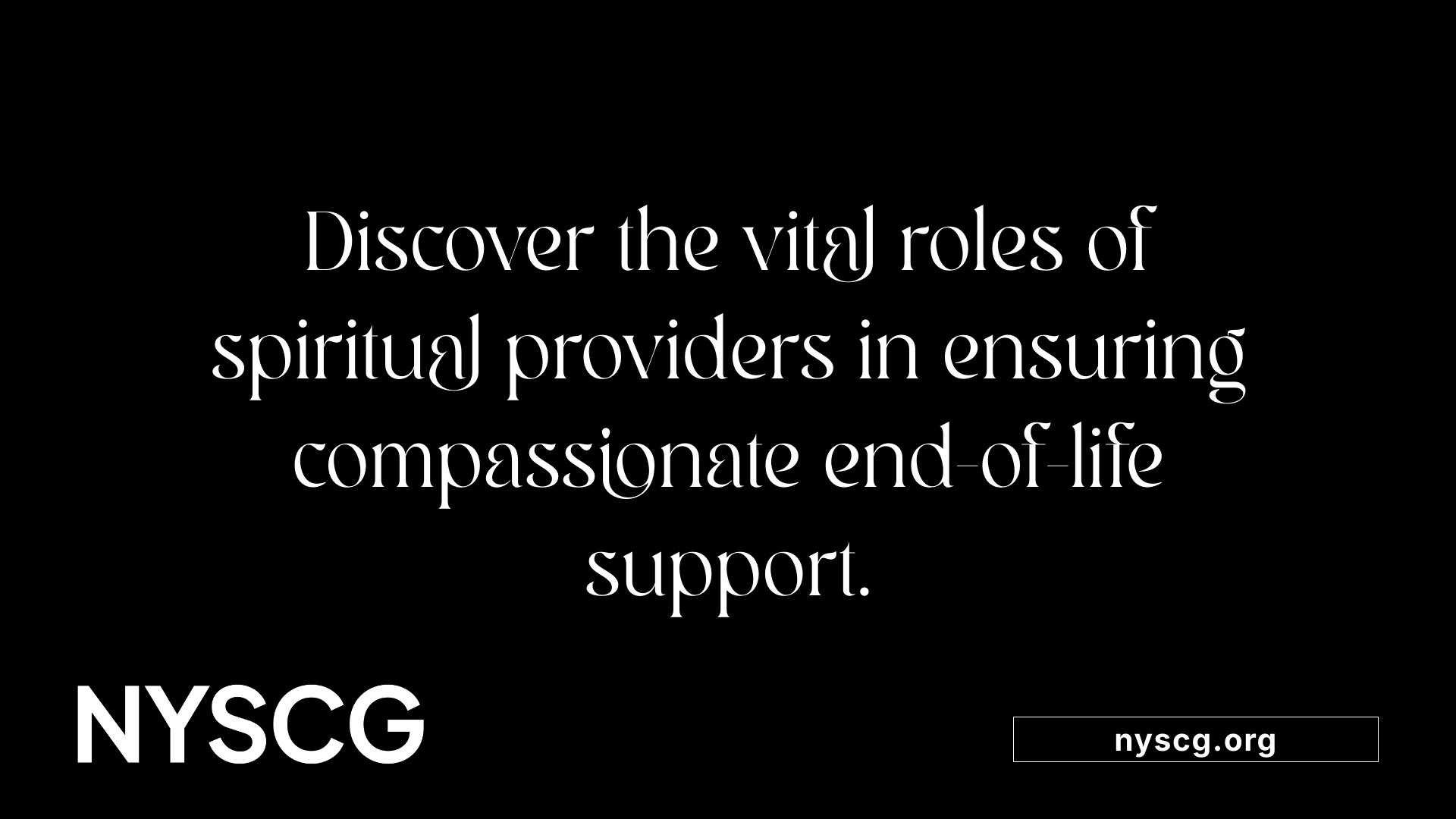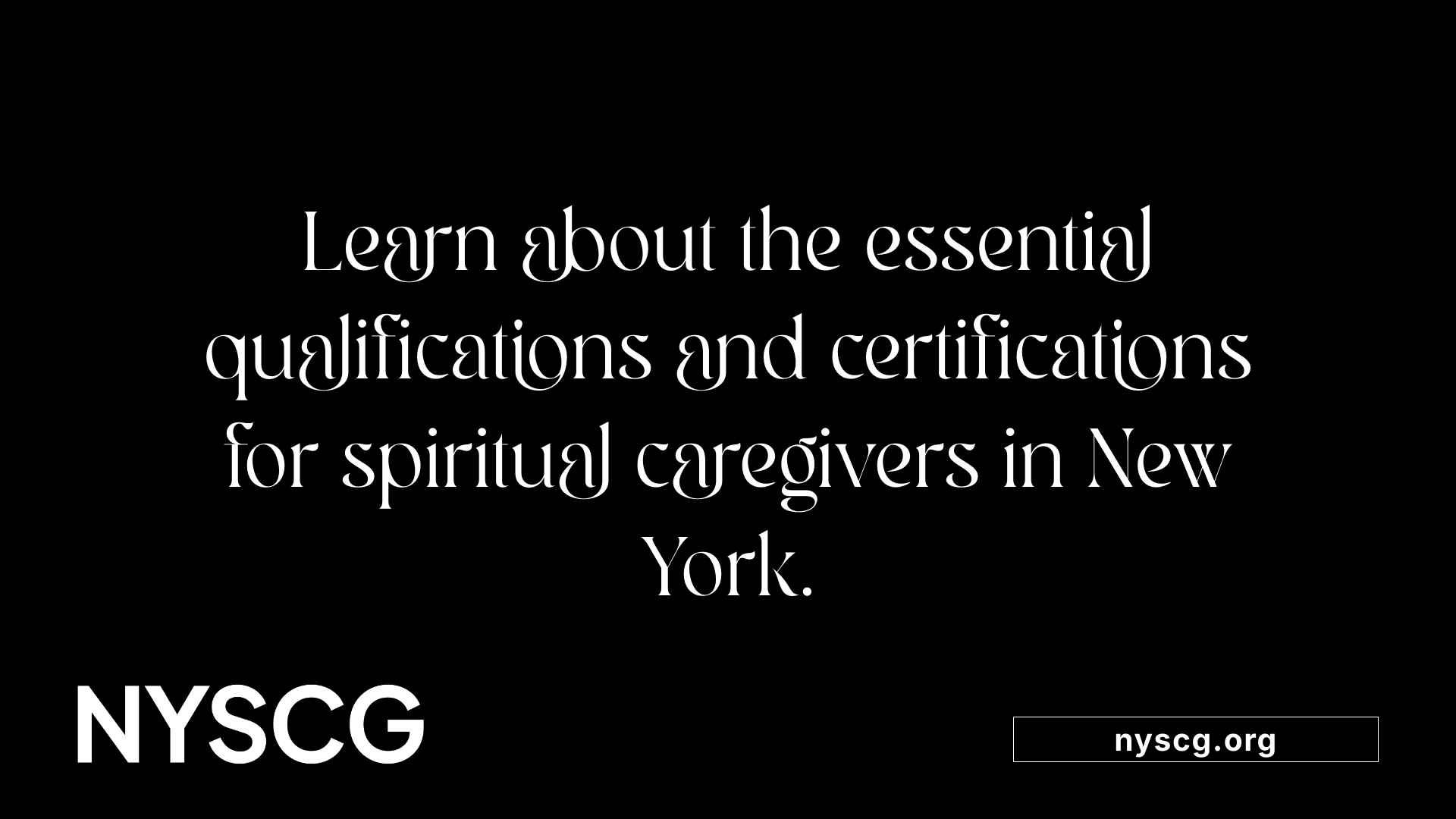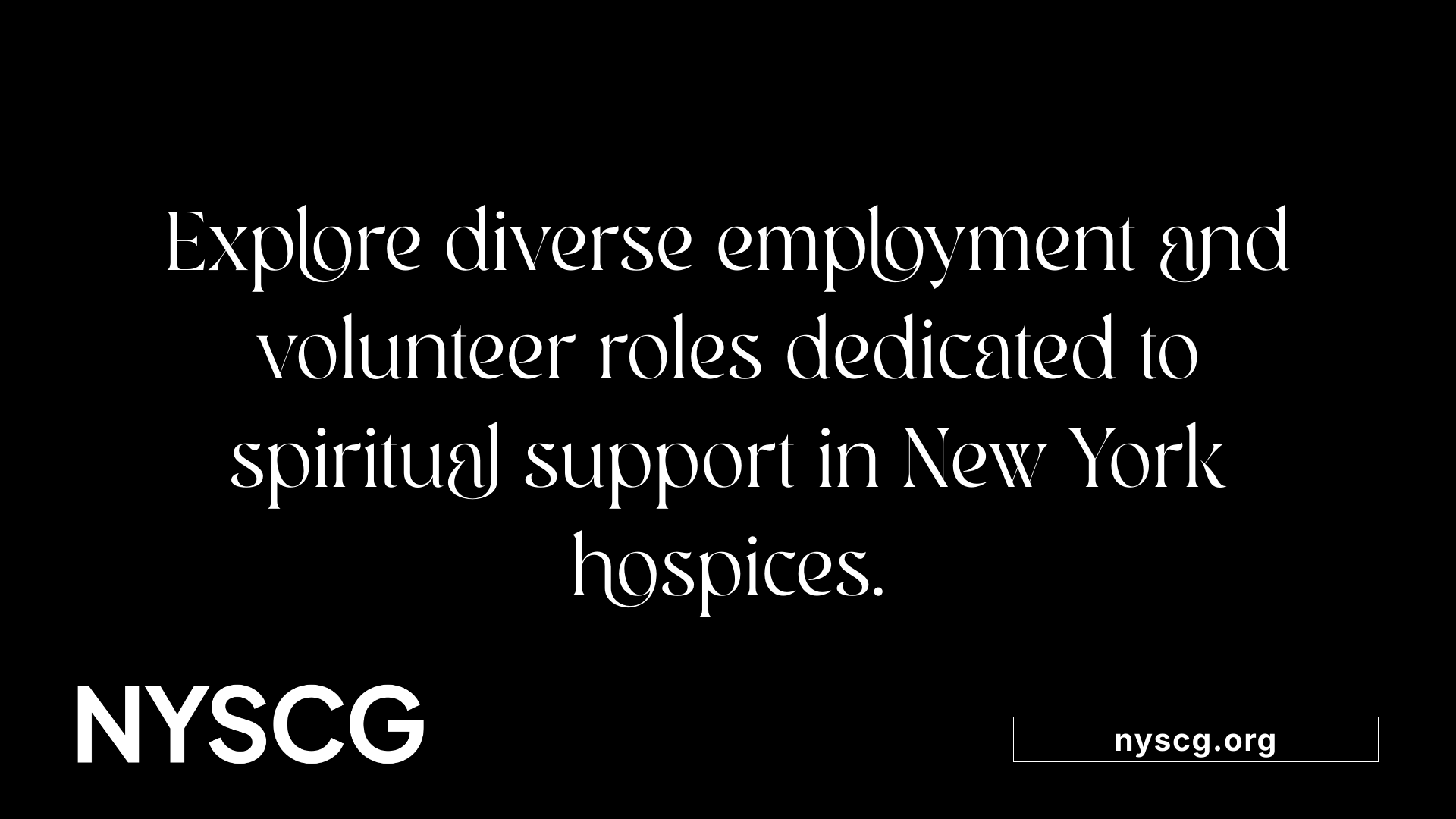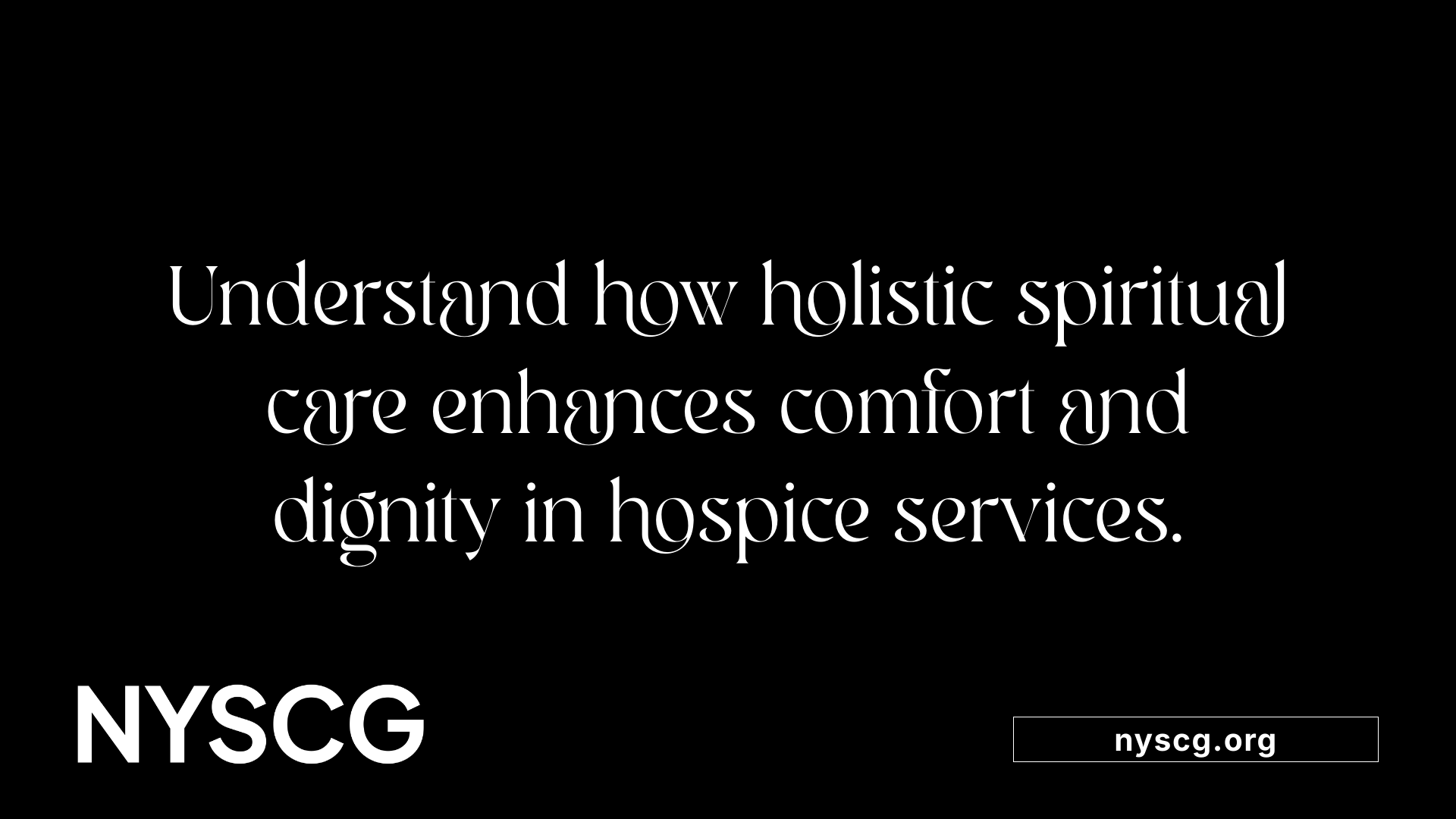Spiritual Support Positions in New York Hospice Care Facilities


Spiritual support plays a vital role in providing holistic, compassionate hospice care in New York. It addresses emotional, spiritual, and existential needs of patients and their families, helping them find peace, meaning, and comfort during a challenging phase of life. This article explores the various roles, qualifications, opportunities, and regulations surrounding spiritual support positions within the state's hospice facilities.

Spiritual support providers play an essential part in hospice services by focusing on the emotional and spiritual well-being of patients and their families. Their primary role is to offer comfort through empathetic listening and spiritual counseling that respects each individual’s beliefs and values.
These professionals facilitate various spiritual practices, including prayer, scripture reading, rituals, and ceremonies tailored to the faith and preferences of each patient. They also help patients find meaning and purpose at the end of life, alleviating fears and feelings of guilt associated with dying.
Supporting diverse faiths and beliefs is a fundamental aspect of their work. Providers collaborate with religious leaders and community resources to ensure patients access spiritual support aligned with their traditions and cultural backgrounds.
Beyond individual care, spiritual counselors help connect families to broader community resources such as faith groups, chaplains, and grief support services. They often organize support groups and grief counseling sessions, which extend emotional comfort beyond the immediate end-of-life period.
Another crucial responsibility is bereavement support. After a loved one’s death, providers offer ongoing counseling, grief management, and memorial services to help families cope with loss.
To effectively fulfill these roles, spiritual care providers usually possess advanced training in theology or pastoral studies and experience working with terminally ill patients. Their holistic approach aims to provide peace, hope, and comfort, ensuring patients and families experience dignity and compassion throughout the hospice journey.
| Responsibilities | Activities | Additional Details |
|---|---|---|
| Emotional comfort | Listening, counseling, emotional support | Tailored to individual needs |
| Facilitating rituals | Prayer, reading, spiritual ceremonies | Respecting religious traditions |
| Supporting faith diversity | Customizing support for various beliefs | Formal and informal |
| Connecting with resources | Community links, chaplain referrals | Enhances spiritual well-being |
| Bereavement support | Grief counseling, support groups | Extended support period |
This comprehensive role ensures that spiritual providers help patients and families find peace, meaning, and comfort during challenging times, making end-of-life care more holistic and compassionate in New York.

Caregivers providing spiritual and emotional support in New York hospice settings need specific qualifications to ensure high-quality, compassionate care. A common educational requirement is holding a Master of Divinity, or a degree in Pastoral Studies, Religion, or Theology. These programs provide a deep understanding of spiritual frameworks and pastoral care methods.
In addition to formal education, completing at least one unit of Clinical Pastoral Education (CPE) is essential. CPE offers supervised practical experience working with patients facing serious illnesses and helps develop skills in providing spiritual guidance in clinical settings.
Experience is also vital. Candidates generally need at least two years of work involving spiritual or pastoral care with terminally ill patients. This experience helps build sensitivity and skills necessary for end-of-life care.
Certifications from recognized professional organizations can enhance credibility. For example, completing the Foundations of Hospice Chaplaincy Certificate Course, which covers hospice philosophy, ethics, and cultural considerations, is highly valued. Continuous professional development through workshops and training is encouraged to stay up-to-date with current practices.
State regulations require compliance with the Department of Health’s standards for hospice care, including adherence to HIPAA and organizational policies. Certification and ongoing education help ensure caregivers meet these legal and ethical standards.
Overall, becoming a spiritual caregiver in New York involves a blend of formal education, specialized training, relevant experience, certification, and compliance with regulatory standards, all directed toward offering respectful and culturally sensitive support to patients and their families.

Hospice care in New York actively involves various roles for those dedicated to spiritual and emotional support. For paid positions, hospices like Hudson Valley Hospice, Calvary Hospital, and Northwell Health regularly seek qualified professionals such as chaplains, spiritual care coordinators, and religious leaders like rabbis or pastors. These roles focus on providing comfort, conducting religious rituals, and supporting patients’ spiritual needs at the end of life.
Training programs offered by some hospices enhance the skills of prospective staff. For instance, Hudson Valley Hospice provides an intensive three-week Home Health Aide course, accommodating individuals interested in hospice care careers at no cost. Additionally, many organizations prefer candidates with qualifications like a Master of Divinity or Pastoral Studies, and at least one unit of Clinical Pastoral Education. Such comprehensive training ensures that spiritual care providers are well-prepared to handle delicate situations.
Volunteer roles are also vital components of hospice care. Community members can serve as spiritual volunteers or chaplaincy volunteers, aiding in worship services, spiritual rituals, and emotional support for patients and families. Volunteers are often integrated into interdisciplinary teams, working alongside nurses, social workers, and therapists to deliver holistic care.
Overall, the landscape presents diverse opportunities—from employment to volunteer service—allowing community members and professionals alike to contribute meaningfully to compassionate end-of-life care. These roles foster professional growth, deepen community engagement, and ensure that patients receive personalized spiritual support during challenging moments.
| Opportunity Type | Description | Relevant Organizations |
|---|---|---|
| Paid Roles | Chaplains, spiritual care coordinators, religious leaders | Hudson Valley Hospice, Northwell Health, Calvary Hospital |
| Volunteer Roles | Spiritual support volunteers, chaplaincy volunteers | Local hospices, faith-based organizations |
| Training Programs | Hospice-specific certification, intensive courses | Hudson Valley Hospice, other regional providers |
| Team Collaboration | Integrated into interdisciplinary teams | All major NY hospice providers |
| Community Engagement | Supporting local spiritual communities and events | Community-based organizations |

Spiritual support plays a vital role in providing comprehensive hospice care across New York. It goes beyond managing physical symptoms to address the emotional and existential needs of patients. Trained chaplains and spiritual counselors are integral to this process, offering comfort and guidance tailored to each individual’s beliefs and cultural background.
This type of care helps patients find peace, meaning, and a sense of purpose during their final days. It encourages important conversations about mortality, preserving life stories and traditions that are significant to the patient and their loved ones.
Hospice providers like Calvary Hospital and Northwell Health actively incorporate spiritual care as part of their services. They organize rituals, offer emotional support, and create a respectful space for patients and families to explore their spiritual journeys.
Once a patient passes, spiritual support continues for families, helping them cope with grief and loss. This ongoing care fosters a sense of connection and healing, making spiritual support a cornerstone of holistic hospice services in the region.
| Organization | Services Offered | Focus Areas |
|---|---|---|
| Hudson Valley Hospice | Training, patient-family spiritual support | End-of-life care, emotional comfort |
| Calvary Hospital | Palliative, spiritual, grief counseling | Advanced illness, family support |
| Northwell Health | Inpatient, home, spiritual, everyday support | Quality of life, patient dignity |
| Niagara Hospice | Symptom management, caregiver relief | Comfort, emotional closeness |
Understanding the impact of spiritual support reveals its importance in fostering dignity, hope, and peace among patients and loved ones during one of life's most profound moments.
Spiritual support positions in New York hospice care are integral to delivering comprehensive, compassionate, and culturally sensitive end-of-life care. Qualified spiritual caregivers—whether chaplains, clergy, or spiritual counselors—bring expertise, empathy, and a deep respect for patient diversity. They work within regulated frameworks, continuously enhance their skills through specialized training, and serve in varied roles—from providing prayer and rituals to offering grief support. As hospice organizations grow and evolve, the need for dedicated spiritual support staff remains vital to ensuring that patients and families experience peace, dignity, and emotional comfort during their final journey.
All you need is the will to make the world a better place.
New York State chaplain group inc. is a tax deductible organization with a federal tax Id number 92-383-4921